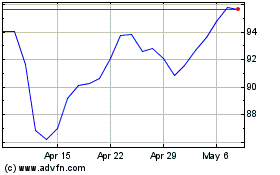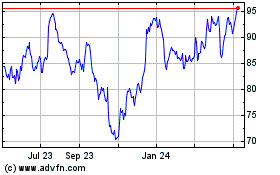Morgan Stanley Settles ETF Investment Case -- Update
February 14 2017 - 6:01PM
Dow Jones News
By Dave Michaels
Morgan Stanley admitted Tuesday that it failed to properly
oversee sales of complex exchange-traded funds to investors,
agreeing to pay $8 million to settle a probe by the Securities and
Exchange Commission.
The case marks the second time in five years that regulators
have accused Morgan Stanley of inappropriate sales of inverse ETFs,
products that move in the opposite direction of a market they track
and that can be used to hedge other investments. In the latest
case, Morgan Stanley in many cases didn't follow its procedures for
selling the products, including getting a signed statement from
clients attesting that they understood the risks, the SEC said.
A Morgan Stanley spokeswoman said the bank is "pleased to have
resolved this matter" and declined to answer additional
questions.
The SEC's move shows how regulators have ramped up their
oversight of ETFs, funds that trade on exchanges like stocks and
have proliferated in recent years as sponsors offer evermore
complex and specialized strategies. Former SEC Chairman Mary Jo
White said last year that the agency would further scrutinize ETFs,
including how they are pitched by brokers and financial
advisers.
Regulators and sponsors of leveraged and inverse ETFs warn they
should be used as short-term investments because, due to the
effects of compounding, their performance over longer periods will
likely diverge from the index they are supposed to follow.
Morgan Stanley's wealth-management unit sold inverse ETFs from
2010 to 2015, the SEC said, and in many cases solicited clients
using "retirement accounts with long-term horizons." Some clients
held the funds for "months or years" and lost money on the
investments, the SEC said in a settlement order.
In 2012, Morgan Stanley agreed to pay a $1.75 million fine to
settle an investigation by the Financial Industry Regulatory
Authority that accused its brokerage unit of similar misconduct.
Finra, the brokerage industry's self-regulator, said Morgan Stanley
sold inverse ETFs in 2008 and 2009 to investors who had
conservative investment goals or risk appetites.
Even after that settlement, Morgan Stanley failed to
sufficiently upgrade its oversight of financial advisers who sold
inverse ETFs, the SEC's documents say. The firm couldn't find the
required client statements for 44% of the accounts that purchased
inverse ETFs from 2010 to 2015, the SEC said in its order. In those
cases, according to the SEC, Morgan Stanley managers also failed to
conduct appropriate risk checks to verify the investor didn't stake
too much on the position or misunderstand the product.
Morgan Stanley also failed to heed warnings flagged by SEC
examiners and its own internal auditors who raised questions about
how the firm monitored sales of inverse ETFs, the SEC said. Morgan
Stanley told the SEC examiners that its compliance systems didn't
need to be improved, the SEC's documents said.
Write to Dave Michaels at dave.michaels@wsj.com
(END) Dow Jones Newswires
February 14, 2017 17:46 ET (22:46 GMT)
Copyright (c) 2017 Dow Jones & Company, Inc.
Morgan Stanley (NYSE:MS)
Historical Stock Chart
From Mar 2024 to Apr 2024

Morgan Stanley (NYSE:MS)
Historical Stock Chart
From Apr 2023 to Apr 2024
